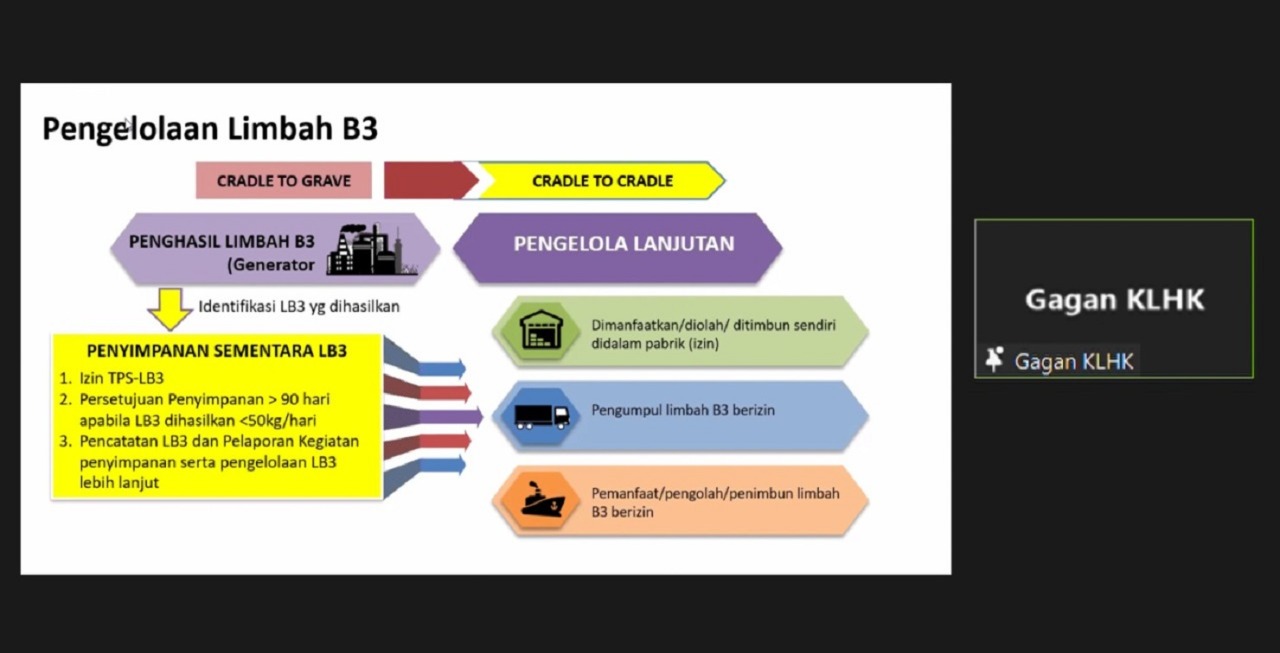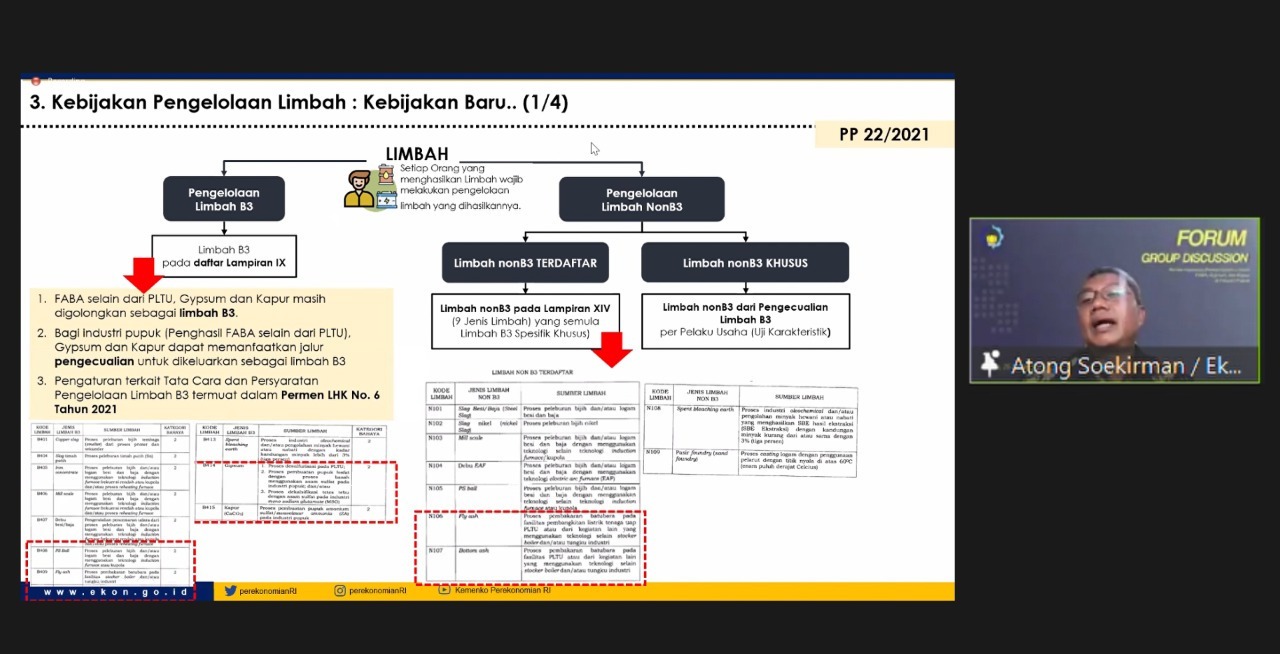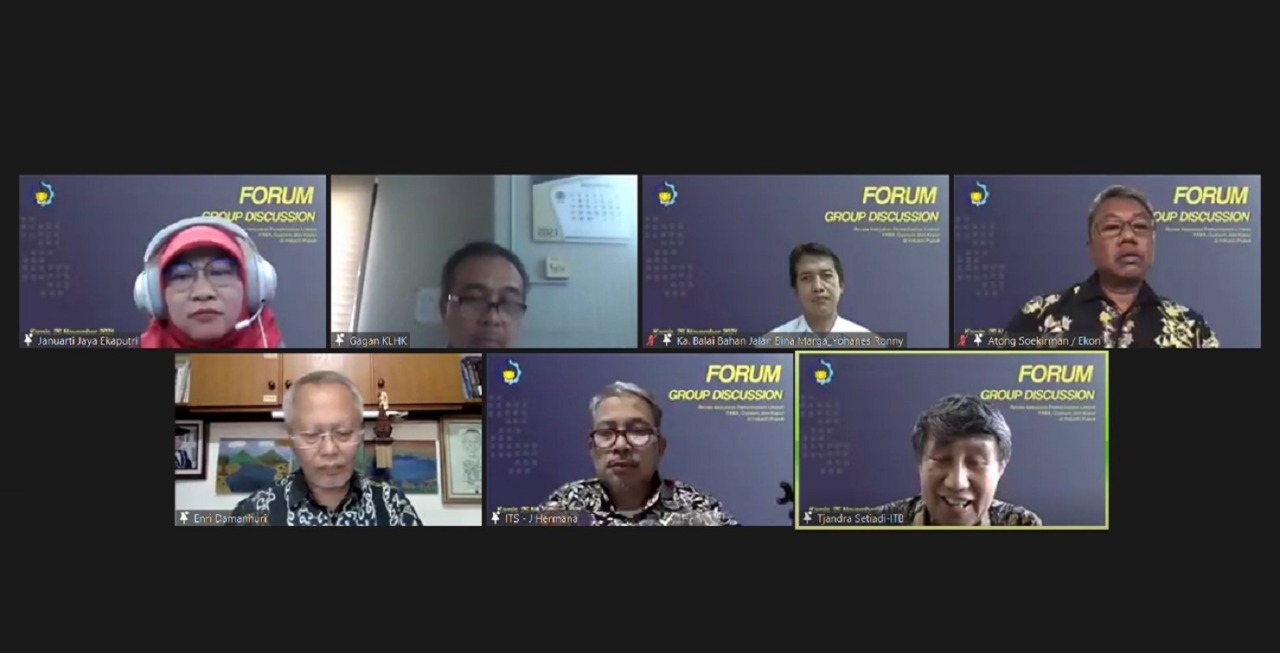ITS Initiates Discussion to Highlight the Utilization of FABA, Gypsum, and Chalk Wastes
ITS Campus, ITS News – In Indonesia, the utilization of fly ash and bottom ash (FABA), gypsum, and chalk wastes, which are Hazardous and Toxic (B3) waste, is not as massive as in other countries. Highlighting this, Institut Teknologi Sepuluh Nopember (ITS), in collaboration with Pupuk Indonesia Holding, held an online Forum Group Discussion Discussion (FGD) on Thursday (25/11).
In the first session, the FGD entitled “Policy Review on the Utilization of FABA, Gypsum, and Chalk Wastes in the Fertilizer Industry” invited representatives consisting of relevant policymaker figures. Among them are the Coordinating Ministry for Economic Affairs, the Ministry of Environment and Forestry, the Ministry of Industry, and the Directorate General of Highways of the Ministry of Public Works and Public Housing.
In addition, as responders, Professor of Environmental Engineering from the Bandung Institute of Technology (ITB), Prof. Dr. Ir Enri Damanhuri, professor of Chemical Engineering Study Program ITB, Prof. Ir Tjandra MEng, and ITS Professor of Environmental Engineering, Prof. Ir Joni Hermana MScES PhD.

Exposure to Hazardous and Non-B3 Waste Management by Ir Gagan Firmansyah MSi
The event started with the presentation of Dr. Atong Soekirman SE MM. In his presentation, this Assistant Deputy for Industrial Development of the Coordinating Ministry for the Economy touched on the decision to remove FABA from the list of B3 waste for power plants, as stated in Government Regulation Number 22 of 2021.
Atong said that the issuance of FABA status as B3 waste can increase the economy. For example, the State Electricity Company (PLN) can save IDR 2.7 trillion per year handling FABA. “In the future, the energy used for industrial input will be more affordable. If this is not addressed in such a way, it will hinder or reduce competitiveness,” he explained.
Atong continued, the potential for FABA waste generated by power plants is the same as those of non-power plants. However, FABA waste for the non-power industry still has B3 status. For this reason, it is still a matter of homework and further discussion so that the non-power generation industry is also not burdened by the costs of managing FABA. “I convey this because the costs borne by business actors or industries will affect other industries,” said Atong.
Agreeing with Atong’s explanation, Prof. Ir Joni Hermana MScES PhD said it would be unfair if FABA from non-power generation industries is still on the list of B3 waste. “If the raw materials and technology are the same, the status should be the same. Because basically, it is not non-generating and generating,” he said.

Presentation by Dr Atong Soekirman SE MM in an online FGD
Although its status remains B3 waste, it is possible to use FABA waste from non-generating industries. Head of the Manufacturing Sub-Directorate of the Directorate General of Waste and B3 Waste Management at the Ministry of Environment and Forestry (KLHK), Ir Gagan Firmansyah MSi, revealed that the use of B3 waste occupies the second position in the hierarchy of B3 waste management. “We hope that this utilization will take precedence. KLHK also does not turn a blind eye to technological developments for this utilization activity,” he explained.
According to Gagan, the priority in this utilization is strict safety standards. For this reason, utilization must be following existing procedures and requirements. “That is, the quality must meet the requirements. The Ministry of Environment and Forestry will also continue to monitor and supervise in the context of preventing environmental damage,” he said.
Continuing Gagan’s presentation, Policy Analyst of the Ministry of Industry, Dr Andriati Cahyaningsih SSi MSi, explained the management of B3 waste in the industrial sector. According to her, there are still many challenges faced by industry players, such as technology transfer so that the FABA produced is not categorized as B3 waste, and the management costs are high.

Guest speakers and responders during question and answer in FGD regarding Policy Review on Utilization of FABA, Gypsum, and Chalk Wastes in the Fertilizer Industry
Meanwhile, the second session discussed the use of wastes and the problems faced by industry players and users of FABA, Gypsum, and Chalk. This session was attended by Pupuk Indonesia, President Director of PT Waskita Karya, PT WIKA Beton, Semen Indonesia, Asosiasi Ready Mix Indonesia, Utama Karya, and BUMDes around East Java. (ory/ITS Public Relations)
Reporter: Dya Nur Mangzila Subechi
Related News
-
Supporting the Development of Material Processes, ITS Professors Utilize Biomass Waste
ITS Campus, ITS News — Innovation in material processes continues to develop to support society’s need for environmentally friendly
November 25, 2021 17:11 -
ITS Professor Ideas for Bio-Corrosion Control in Marine Structures
ITS Campus, ITS News — Coastal and offshore buildings interacting directly with seawater trigger damage, including bio-corrosion. If not
November 25, 2021 17:11 -
ITS Launches the First Marine Floating Solar Power Plant Prototype in Indonesia
ITS Campus, ITS News — Institut Teknologi Sepuluh Nopember (ITS)‘s commitment in realizing the energy transition is getting serious.
November 25, 2021 17:11 -
Targeting Champion, Bayucaraka ITS Launches Flying Robot Innovation
ITS Campus, ITS News – The Bayucaraka team at Institut Teknologi Sepuluh Nopember (ITS) has launched four new flying
November 25, 2021 17:11
